Indian Polity Quiz -1
1) Who among the following can participate in the proceedings of both the houses of parliament?
1) Vice-President 2) Solicitor General 3) Chief Justice 4) Attorney General
2) How are legislative excesses of parliament and state assemblies checked?
1) Intervention from President/Governor 2) No-Confidence motions
3) Judicial review 4) General elections
3) What can be the maximum interval between two sessions of parliament?
1) 3 months 2) 4 months 3) 6 months 4) 9 months
4) Which of the following non-member of Parliament has the right to address it?
1) Attorney General of India 2) Solicitor General of India
3) Chief Justice of India 4) Chief Election Commissioner
5) In order to be recognized as an official Opposition Group in the parliament, how many seats should it have?
1) 1/3rd of the total strength 2) ¼ of the total strength
3) 1/6th of the total strength 4) 1/10th of the total strength
6) Which functionary can be invited to give his opinion in the parliament?
1) Attorney General of India 2) Chief Justice of India
3) Chief Election commission of India 4) Comptroller and auditor General of India
7) Age of a candidate to contest parliamentary election should not be lesser than:
1) 18 years 2) 21 years 3) 25 years 4) 26 years
8) The most important feature of the Indian Parliament is that:
1) It is the union legislature in India 2) It also comprises of the President
3) It is bicameral in nature 4) The upper house of the parliament is never dissolved
9) Who said, Parliamentary system provides a daily as well as a periodic assessment of the Government?
1) B.R. Ambedkar 2) B.N. Rau 3) Jawahar Lal Nehru 4) Rajendra Prasad
10) Japan’s Parliament is known as –
1) Diet 2) Dail 3) Yuan 4) Shora
Answers:
1. 4 2. 3 3. 3 4. 1 5. 4 6. 1 7. 3 8. 2 9. 1 10. 1
(0)
